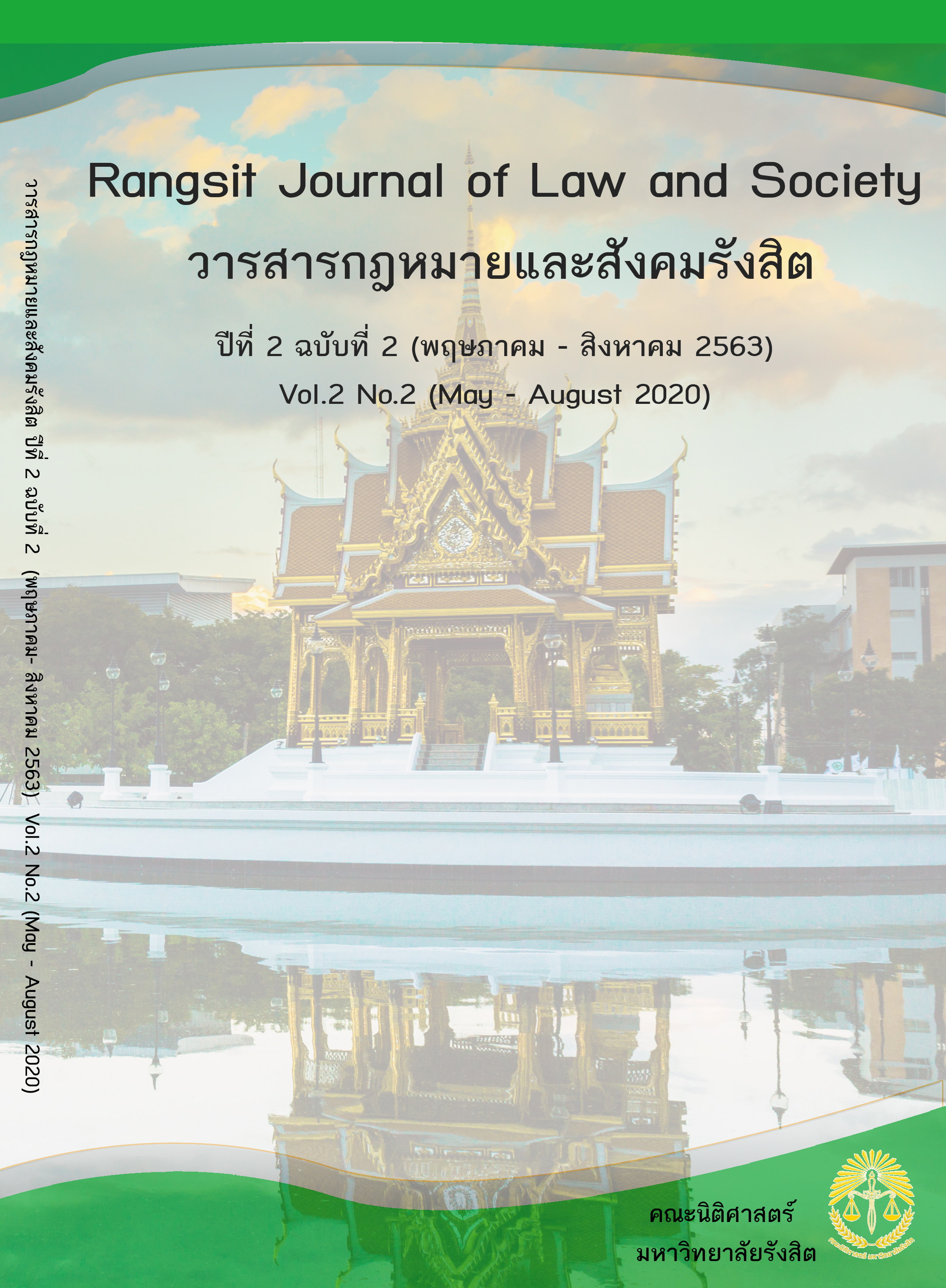ผู้เสพยาเสพติดคือผู้ป่วยในสาธารณรัฐโปรตุเกส
Main Article Content
บทคัดย่อ
ประเทศไทยประสบปัญหาการป้องกันและปราบปรามยาเสพติดมาอย่างต่อเนื่องยาวนาน และส่งผลให้มีการฟ้องร้องดำเนินคดีกับผู้กระทความผิดมากมาย และต้องโทษจำคุกเป็นจำนวนมากถึงร้อยละ 80 ของผู้ต้องขังทั้งหมด ส่งผลให้เกิดสภาพ “นักโทษล้นเรือนจำเรื้อรัง” ต่อเนื่องมาหลายสิบปีแล้ว ซึ่งยังคงเป็นปัญหาที่มาถึงปัจจุบัน จากการศึกษาการป้องกันและปราบปรามเกี่ยวกับยาเสพติดในสาธารณรัฐโปรตุเกสพบว่าในมิติทางนิติบัญญัติ ได้มีการลดทอนความผิดอาญาลงสำหรับผู้เสพยาเสพติด โดยได้กำหนดให้ ผู้เสพยาเสพติด มีสถานะเป็นผู้ป่วย จึงไม่เป็นความผิดอาญา ไม่ต้องถูกดำเนินคดี และยังมีมาตรการป้องกัน แก้ไขเยียวยา การบำบัดรักษาอย่างเป็นระบบ ที่เป็นกฎหมายเกี่ยวกับทางการแพทย์และสาธารณสุขที่เข้ามาดูแลในเรื่องสุขภาพ และการลดอันตรายของผู้เสพยาเสพติดและลดอันตรายของสังคมที่ได้รับผลกระทบจากการเสพยาเสพติดของผู้ใช้ยา ซึ่งส่งผลให้มีปริมาณคดีเกี่ยวกับยาเสพติดที่ถูกฟ้องร้องดำเนินคดีขึ้นสู่ศาลน้อยลง การดำเนินคดีเฉพาะอาชญากรเกี่ยวกับยาเสพติดเท่านั้น ซึ่งได้แก่ ผู้ผลิต ผู้จำหน่าย ที่ไม่ได้รับอนุญาตจากรัฐ และยังส่งผลถึงเรือนจำในประเทศสาธารณรัฐโปรตุเกสที่มีผู้ต้องขังน้อยมาก บางแห่งต้องปิดเรือนจำ แนวคิดรูปแบบและแนวทางของสาธารณรัฐโปรตุเกสในเรื่องนี้น่าสนใจมากสมควรจะต้องนำมาประยุกต์นโยบายทางนิติบัญญัติในการลดทอนความผิดอาญาของไทย ที่กำหนดให้ผู้เสพเป็นผู้ป่วย และการสร้างกระบวนการป้องกัน บำบัดรักษาทางการแพทย์และสาธารณสุขขึ้นมารองรับอย่างมีประสิทธิภาพ อันจะเป็นผลดีต่อการจัดการกับปัญหายาเสพติดและปัญหาผู้ต้องขังล้นเรือนจำที่เป็นปัญหาของประเทศไทยได้
Article Details

อนุญาตภายใต้เงื่อนไข Creative Commons Attribution-NonCommercial-NoDerivatives 4.0 International License.
เอกสารอ้างอิง
วศิน สุวรรณรัตน์. (2561). มาตรการลดทอนความผิดทางอาญาของผู้เสพยาเสพติด. ใน ดุษฎีนิพนธ์นิติศาสตรดุษฎีบัณฑิต. กรุงเทพมหานคร: มหาวิทยาลัยรามคำแหง.
ศรีสมบัติ โชคประจักษ์ชัด และคณะ. (2548). ผลการดําเนินงานตามพระราชบัญญัติฟื้นฟูสมรรถภาพผู้ติดยาเสพติด พ.ศ.2545. กรุงเทพมหานคร: กรมคุมประพฤติ.
ศักดิ์ชัย เลิศพานิชพันธุ์. (2556). การศึกษากฎหมายยาเสพติดในต่างประเทศ: ศึกษาเฉพาะกรณีประเทศญี่ปุ่น
ฝรั่งเศส สวิตเซอร์แลนด์ เยอรมัน โปรตุเกส อังกฤษ และสหรัฐอเมริกา. กรุงเทพมหานคร: สำนักกิจการในพระราชดำริพระเจ้าหลานเธอ พระองค์เจ้าพัชรกิติยาภา สำนักงานปลัดกระทรวงยุติธรรม.
Allen, L., Trace, M. and Klein, A. (2004). Decriminalization of drugs in Portugal: A current overview. Retrieved from Drug Scope/The Beckley Foundation: https://www.researchgate.net/publication/238070854_The_Effects_of_Decriminalization_of_Drug_Use_in_Portugal
De Andrade P.V. and Carapinha L. (2010). Drug decriminalisation in Portugal. London: BMJ.
European Monitoring Center for Drug and Drug Addiction. (2018). Portugal Drug Report 2018. Retrieved from http://www.emcdda.europa.eu/countries/drug-reports/2018/portugal_en
Greenwald, Green. (2009). Drug Decriminalization in Portugal: Lessons for Crating Fair and Successful Drug Policies. USA: CATO Institute.
Hawkes N. (2011). Highs and lows of drug decriminalisation. London: BMJ.
Hollersen W. Portugal. (2013). 12 Years after Decriminalizing Drugs. Retrieved from Spiegel Online: https://www.transcend.org/tms/2013/04/this-is-working-portugal-12-years-after-decriminalizing-drugs
Hughes C.E. (2006). Overcoming obstacles to reform: Making and shaping drug policy in contemporary Portugal and Australia. Retrieved from https://minerva-access.unimelb.edu.au/handle/11343/39229
Laqueur H. (2015). Uses and abuses of drug decriminalization in Portugal. Law & Social Inquiry, 40(3), 746-781.
Moreira M.et al. (2011). European Monitoring Centre for Drugs and Drug Addiction. Drug policy profile: Portugal Lisbon, 1999-2004.
Stevens A. (2012). Portuguese drug policy shows that decriminalization can work, but only alongside improvements in health and social policies. Retrieved from European Politics and Policy at LSE: https://eprints.lse.ac.uk/49453/
Szalavitz M. (2019). Drugs in Portugal: Did Decriminalization Work. Retrieved from Time Magazine: https://norml.org/blog/tag/szalavitz
United States Drug Enforcement Administration. (2018). DEA Online. Retrieved from http://www.justice.gov/dea/ongoing/portugal.html

